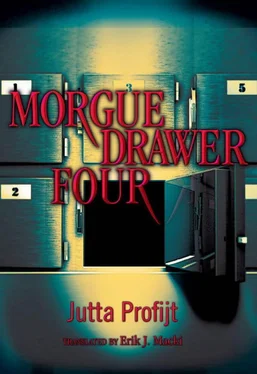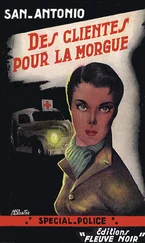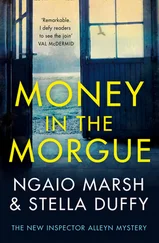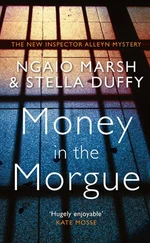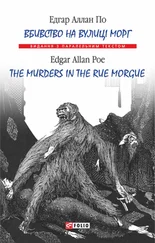“Hey,” I yelled. “What are you doing?”
Martin wouldn’t be deterred.
“My condolences,” he said, shaking my father’s hand.
“Thank you,” my father said, then took a second look at Martin. “I’m sorry; I don’t think we know each other.”
“No,” Martin confirmed. “But I, uh, knew your son.”
“Martin, cut that shit out,” I said, genuinely irritated. “What are you going to tell them? That I’m living in the basement at your Institute and that I frequently piss you off?”
“Where did you know him from?” my mother asked, still sobbing.
“I, uh, he gave me a tip once in a murder case that I was investigating,” Martin said.
“A murder case?” my father said. “Figures—that boy sank so low. He got mixed up with the wrong kinds of people.”
“No, no,” my do-gooder here hastened to reassure them. “He only passed on a piece of information. He didn’t have anything to do with the crime.”
Nice phrasing there, if he was talking about this case that I had taken over the lead on, because near as I can recall there wasn’t another case where I’d have passed on any valuable information to him.
“So you’re with the police?” my father asked.
“From the forensics unit,” Martin said. I had the impression that he wasn’t using this circumlocution for the first time.
“How was he doing, then?” Mom asked. “Was he OK?”
“Yes, he was doing well,” Martin said, but I sensed that the question was throwing him off track a bit. In fact, he had absolutely no idea how I was doing, or rather, had been doing. He had never asked me what my life had been like. Or where I’d lived. And that made me wonder what was actually going to happen with my apartment.
“What are they going to do with my apartment?” I asked.
“His apartment looked so…” My mother was searching for the right words. “So depressing.”
“A shithole,” my father said, correcting her.
Martin was terribly embarrassed; he didn’t know what he was supposed to say.
“It was a temporary solution,” Martin finally said.
“On his way to homelessness,” my father said. “He threw in the towel on his apprenticeship.”
Yeah, well, Einstein dropped out of school, too, as I always used to retort back in the days before he threw me out of the house. “Anyone who eats at my table must finish his apprenticeship,” was what he would say.
“The master mechanic is always picking on me,” I would say. “Well then he must have a reason to,” my father said.
He was right, of course. The master mechanic was envious. I was the best auto freak who had ever worked in that dive. I only needed to listen to an engine to know what was wrong with it. DTC reader software, inspection checklists: kids’ stuff. Me, I would turn the key and just know what was up. Plus, I could break into any car within thirty seconds. They dispatched me just three weeks into my apprenticeship when a customer lost his key. Me. Not the master mechanic. This kind of cramped his style, which I didn’t know at the time, because he used to go squeeze in a lay every time he left the workshop. That’s why it always took him so long when he was sent out. Because he had at least eight fillies raring to go, who were all apparently just waiting for some yuppie to accidentally toss his car keys into the trash along with his burger wrapper. And then the master mechanic would be off to help both the yuppie and some über-horny little mouse right after that.
And then I came along. I could break into cars like a world champion, and I’d be back at the workshop in less than thirty minutes. The owner liked that, but the master mechanic didn’t. From then on every day meant putting up with the master mechanic’s hazing.
And that’s not even mentioning the meager pay. So one day after I’d pulled the emergency car-door-opening routine for, let’s say, a third customer, I got even more shit unloaded on me at work, and then the stress from my mom at home was of course pissing me off, too, and I just hit my limit, ditched the apprenticeship, and moved out. That was four years ago. My mother didn’t even try to get in touch with me, presumably because my father forbade her. That’s how things were at our house.
Here and now I’d hit my limit again. My father made me sick, although I somehow felt sorry for my mother, even though at the same time I despised her. What kind of mother lets someone forbid her from getting in touch with her only child? I didn’t want anything else to do with either of them.
“Martin, stop lying to people and start paying attention to more important things,” I said.
Martin said goodbye to my parents and slowly walked toward the exit.
“Kitty corner behind you to the right is a girl,” I said, and Martin turned around with a jerk.
“I think her name is Miriam, or something like that.”
“Who is she?” Martin asked.
“The sister of a former buddy,” I said. “I want to know what she’s doing at my funeral.”
“You don’t mean you want me to just walk over to her and ask that?” Martin said.
“Well, yeah, dude,” I replied. “There’s got to be a reason, because I hardly knew her. Maybe her being here has something to do with my murder.”
Martin hesitated. All of this was terribly embarrassing to him, I could sense that clearly.
“Well, get going,” I pressed, and he gave in.
She was still standing a ways back from the grave, from my grave to be exact, and as we came closer we could see she had tears in her eyes. What the?
“Hello. My name is Martin Gänsewein.”
She had masterful self-control and didn’t start giggling or grinning or anything on mention of his silly name. She just nodded at him.
“Did you know him well?” Martin asked politely.
Miriam, who I was still hoping was named Miriam, since she didn’t introduce herself, sniffled. And shook her head.
“I did,” Martin said. “He told me about you.”
Her flood of tears redoubled.
“You’re the sister of the artist, right?”
“Artist?” She looked at him like he’d just informed her that a large, green mushroom was growing out of the top of her head. “He called Gugi an artist?”
Martin was somewhat annoyed by her completely dumb-founded expression, and I was annoyed because he had apparently taken note of my whole stream of thoughts from before, which I now found a little embarrassing.
“Yes, an artist. That’s what he called him,” Martin confirmed, hesitating as though he had to think back and make sure he’d noted the right information under the right name.
Miriam erupted into loud bawling.
“He always used to make fun of Gugi and I, especially of Gugi,” she sobbed. “Because of his speech impediment.”
Of Gugi and ME! roared Martin’s internal grammar check, but he held back.
I did not! I screamed inside, but I kept my trap shut, too.
“I’m sure he was just teasing,” Martin suggested, but his intonation expressed his doubt just as clearly as his face.
“Did you use to make fun of him?” he asked me sternly.
“Within the normal range,” I said.
“So, that would be a yes,” Martin determined. Disappointedly, I noticed. “I’m thinking that you were a pretty big asshole while you were alive, huh.”
Hearing the word asshole within the convolutions of Martin’s brain, at the edge of my open grave to boot, nearly cost me all my self-control. Only Miriam’s presence saved me—and Martin.
“Just ask her why she’s here,” I said. Miriam beat him to it. “I liked him, despite all that,” she whispered.
“Oh,” Martin said. “I’m sorry.”
And that’s exactly how he meant it, too, that dickface. He was sorry she had liked such an asshole. If this guy was supposed to be my only friend on earth, then I’d rather not have any more friends. None at all. That would clearly be better.
Читать дальше
